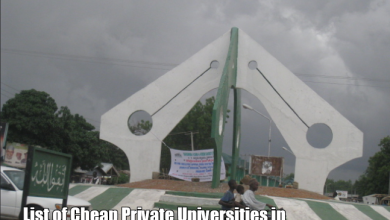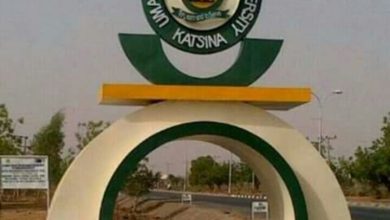Universities With The Lowest Cut-Off Marks For Science Education In Nigeria
Are you trying to find the list of Nigerian universities with the lowest cut-off mark required to get admitted to the science education? Read on to know Nigeria Universities with the lowest cut-off mark.
If you want to pursue a career in science education but are unsure about the most recent jamb cutoff mark for a course like science education.Here is a list of Nigerian institutions that have cut-off mark that we have verified; it is the lowest of all the universities in Nigeria that provide science education.
READ ALSO: List Of Universities That Has Lowest Cut-off Mark For Physical Science
Universities With The Lowest Cut-Off Marks For Science Education In Nigeria

To gain admission into an science education program at a Nigerian university, meeting the cut-off mark for the subject is essential. The following universities have some of the lowest cut-off marks for science education
1. Yobe State University, Damaturu (YSU)
Cut off mark: 170
During the meeting of the committee on a blueprint for the educational development of Yobe state, the sub-committee on higher education presented the report emphasizing the necessity of a university in Yobe. The committee suggested to the state government the noble notion of constructing a state university in Damaturu.
As a result of the National University Commission’s (NUC) encouragement of state and private organizations to establish viable universities, as well as the rapid growth of post-primary and tertiary institutions in the state, it became obvious that a large number of potential university candidates would emerge seeking admission into the university in Yobe. Under the direction of His Excellency Governor Bukar Abba Ibrahim, the state made the decision to build a university that would be known as Bukar Abba Ibrahim University. Immediately after this decision was made, the planning committee was initially established, and Professor Muhammad Nur Alkali was appointed as the chairman. When January 2007 rolled around, the group began making preparations for the launch of the university.
2. University of Port Harcourt (UNIPORT)
Cut off mark: 180
Choba, which is located in Port Harcourt, Rivers state, is where you will find the University of Port Harcourt. This institution is situated in the Niger-Delta region of Nigeria. It was initially created in 1975 under the name University College, Port Harcourt, and in 1977 it was elevated to the status of a university.In 2015, Times Higher Education ranked the University of Port Harcourt as the sixth best public university in Africa and the first best public university in Nigeria.It was in July of 2021 that Professor George Owunari was given the position of substantive Vice-Chancellor of the Institution.
3. Renaissance University, Agbani (RNU)
CUT off mark: 180
The Renaissance University can be found in Ugbawka, which is situated in the Nkanu East Local Government Area of Enugu State in Igboland. It is situated off the Enugu-Port Harcourt Express Road, which is in route to Ebonyi State.
From the city of Enugu, which serves as the capital, the campus may be accessed by road in less than half an hour. Each of the three universities—Abia State University (Uturu), Ebonyi State University (Abakaliki), and the University of Nigeria, Nsukka—can be reached by car in approximately one hour. It takes between two and two and a half hours to get to the commercial centres of Aba and Port Harcourt because of their distance from the city.
There are two universities in the Nkanuland region of Enugu State, and this one is one of them. The other one is the Enugu State University of Science and Technology (ESUT), which is the first state university of technology in Nigeria. It is situated in Agbani in the Nkanu West Local Government Area.
READ ALSO: List Of Universities That Has Lowest Cut-off Mark For Industrial Chemistry
FAQS
What does the education of science entail in Nigeria?
Learners are exposed to the contents as well as the methodology (processes) of acquiring scientific knowledge for practical application in relevant and applicable areas of life endeavours such as life on the planet, production of essential human needs like soap of all kinds, creams, and so on. Science education is a field of study that exposes learners to both the contents and the methodology of acquiring scientific knowledge.
How many years does one spend studying science?
Norms for Completion of Programs
Students who begin their studies at the 100 level are required to complete Integrated Science for a least of four years and a maximum of eight years. Students who begin their studies at the 200 level are required to complete the course for a minimum of three years and a maximum of six years.
Is there a scientific approach to teaching?
It is a branch of science that investigates the nature of knowledge. Specifically, it examines how infants, adolescents, and finally adults acquire knowledge. The concept of education as science refers to a style of knowing that is particularly focused on understanding how knowledge is acquired and how capabilities to know grow. In a way, it is the science that encompasses all other sciences.
How does the education of science in Nigeria work to achieve its goals?
According to the national policy text, the objectives of science education are as follows:
- To cultivate a mind that is inquisitive knowledgeable, and rational for the purpose of the conduct of a good life and democracy
- To produce scientists for the purpose of national development
- To support studies in technology and the cause of technological development
What are the goals of the science education that is being provided in Nigeria?
According to the National Policy on Education, the objectives of science education in Nigeria are as follows: to cultivate an inquisitive, knowing, and rational mind for the purpose of the conduct of a good life and democracy; to produce scientists for the purpose of national development, service studies in technology.








